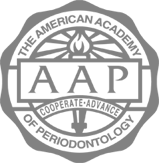Periodontist
Statement on the use of Narcotic Analgesic Drugs in Dentistry
South River Periodontics is firmly committed to reducing exposure to Narcotic Analgesics in our practice. Our country currently faces a crisis of addiction to Narcotic (Opoid) Pain medications. Addiction most commonly begins with drug exposure for a legitimate purpose, and progresses to use of illicit substances to feed a resulting addiction.
Opoid medications are commonly used in dentistry for two reasons, for pain control and for sedation. We seek to reduce prescription of narcotic medications in two ways: The need for sedation to control intra-operative anxiety and pain is well founded. There is scale of invasiveness of procedures, and anxiety of patients which determines the level of sedation necessary to allow periodontal treatment to be rendered. It is an art to determine which level of sedation which is appropriate for each individual patient.
Most if not all pain associated with Periodontal Surgical Procedures can be eliminated by the use of effective local anesthetic medications, which render tissue numb. The combination of local anesthetic medication and strong, short acting anxiolytic medications is generally effective to eliminate anxiety and pain for periodontal surgical, dental implant surgery and extraction of teeth, including third molar teeth. There are, of course, patients and treatments for which general anesthesia with strong opioid pain medications is indicated. We partner with several practitioners who maintain proficiency in these procedures, and whom we trust with the care of patients such as these.
We perform surgical procedures in a minimally invasive and gentle manner. This is the single most important factor which influences postoperative discomfort. In addition to gentle surgical technique, effective preoperative medication with muscle relaxing medications, and locally applied anti-inflammatory medications result in significantly less trauma and post-operative inflammation. Appropriate post-operative anti-inflammatory medications, non-narcotic pain medications and antibiotics produce a predictably comfortable post-operative course. Narcotic pain medications are prescribed for use in the rare instances that they become necessary to control discomfort, and may be used at the patient’s discretion.
Proper rest, nourishment and hydration are extremely important to achieving a satisfactory surgical outcome. Whether periodontal surgery, third molar extraction or dental implant surgery, it is important to have a good night’s sleep both prior to and after surgery. Your sedative regimen specifically directs medications to be taken the night prior to and the night after your surgical treatment. This is to ensure good, sound sleep, as our body repairs itself while we sleep.
Intraveneous narcotic analgesia and sedation protocols strictly forbid eating or drinking anything for twelve hours prior to surgery. This produces a state of hypoglycemia and dehydration in patients. Proper nutrition and hydration are essential to good healing, therefore we are able to encourage our patients to drink plenty of fluids and eat a small, nourishing meal prior to dental surgery. Our oral sedation regimen has no prohibition on food or drink prior to surgery.
Following surgery, nourishment and hydration is just as important. While we discourage eating solid foods until such time as the local anesthesia wears off, a nourishing cold smoothie is encouraged. We have found that if our patients attempt to eat solid food, they tend to injure themselves by biting soft tissue, such as the tongue, cheek or lip. Post-operative antibiotics and non-narcotic pain medications should be taken soon after the smoothie has been consumed and allowed to work while the surgically treated area is still numb.
It has been estimated that over seventy percent of cases of narcotic addiction in our country begin with an exposure to prescription pain medications. We cherish every one of our patients, and care about their overall well-being. While committed to rendering periodontal treatment in a kind, caring and comfortable manner, we are also committed to doing our part to battle this terrible health care crisis.




